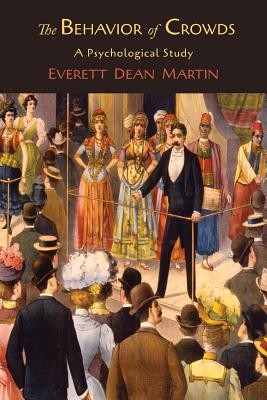
- We will send in 10–14 business days.
- Author: Everett Dean Martin
- Publisher: Martino Fine Books
- ISBN-10: 1614276161
- ISBN-13: 9781614276166
- Format: 15.2 x 22.9 x 1.8 cm, softcover
- Language: English
- SAVE -10% with code: EXTRA
The Behavior of Crowds; A Psychological Study (e-book) (used book) | bookbook.eu
Reviews
Description
2014 Reprint of 1920 Edition. Full facsimile of the original edition, not reproduced with Optical Recognition Software. The "motivation" of this book is the author's conviction that crowd formation and crowd thinking are daily becoming a more serious menace to civilization. "I know of nothing," he says (p. 6), "which today so menaces not only the values of civilization, but also the achievement of personality and true knowledge of self as the growing habit of behavior as crowds." Gustave Le Bon was the first to study seriously the crowd phenomenon. Le Bon described the emotional nature of the crowd man and suggested the importance of unconscious motivation. Martin followed up on Le Bon's account and improved the analysis by applying the concepts of Freudian psychology to the crowd man. In 1924 Floyd H. Allport contributed another important analysis of the mechanisms of crowd behavior. Both Martin and Allport succeeded in reducing the problem of crowd psychology to the problem of individual behavior under special types of motivation. Although many of the same mechanisms may be found in all crowds, they operate to produce different end results depending upon the motivational basis and the total social situation. Insufficient attention has been given to the various crowd patterns.
- Author: Everett Dean Martin
- Publisher: Martino Fine Books
- ISBN-10: 1614276161
- ISBN-13: 9781614276166
- Format: 15.2 x 22.9 x 1.8 cm, softcover
- Language: English English
2014 Reprint of 1920 Edition. Full facsimile of the original edition, not reproduced with Optical Recognition Software. The "motivation" of this book is the author's conviction that crowd formation and crowd thinking are daily becoming a more serious menace to civilization. "I know of nothing," he says (p. 6), "which today so menaces not only the values of civilization, but also the achievement of personality and true knowledge of self as the growing habit of behavior as crowds." Gustave Le Bon was the first to study seriously the crowd phenomenon. Le Bon described the emotional nature of the crowd man and suggested the importance of unconscious motivation. Martin followed up on Le Bon's account and improved the analysis by applying the concepts of Freudian psychology to the crowd man. In 1924 Floyd H. Allport contributed another important analysis of the mechanisms of crowd behavior. Both Martin and Allport succeeded in reducing the problem of crowd psychology to the problem of individual behavior under special types of motivation. Although many of the same mechanisms may be found in all crowds, they operate to produce different end results depending upon the motivational basis and the total social situation. Insufficient attention has been given to the various crowd patterns.


Reviews